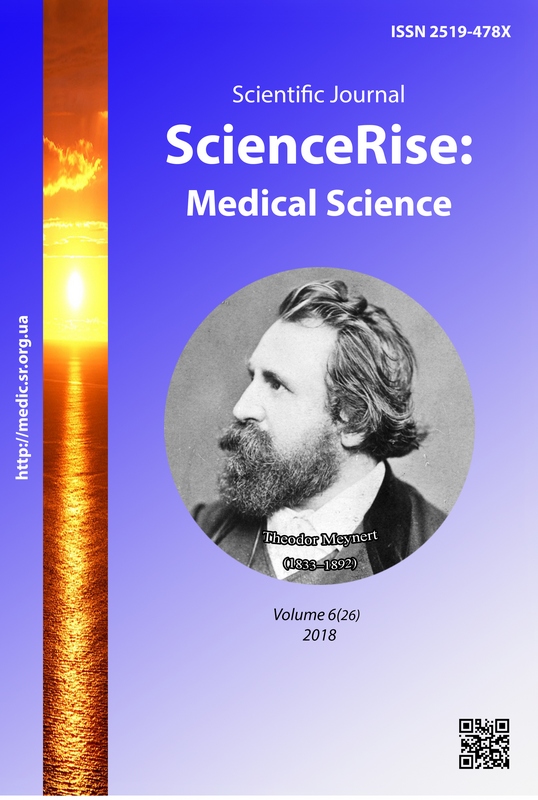Evaluation of the efficiency of psychoeducation in the structure of rehabilitation of patients with alcohol dependence
DOI:
https://doi.org/10.15587/2519-4798.2018.143418Keywords:
alcohol dependence, psycho-education, psychosocial rehabilitation, remission, coping strategies, alcohol consumptionAbstract
Aim of the research: to develop and evaluate the effectiveness of psycho-educational programs in the system of psychosocial rehabilitation of patients with alcohol dependence.
Materials and methods: the study carried out a complex clinical-psychopathological and psycho-diagnostic examination of 150 male patients from 20 to 55 years old, who, according to the diagnostic criteria of ICD-10, had alcohol dependence syndrome. The main group (whose patients took part in the psycho-educational program) consisted of 105 people. The control group included 45 patients who received standard regulated therapy in the hospital.
Results of the study: during the work, a system of rehabilitation of patients with alcohol dependence with the use of psycho-education was developed and tested. The main strategy includes a complex impact on the cognitive, emotional, psycho-physiological, behavioral and social aspects of alcohol dependence.
The main goal of psycho-education is the formation in alcohol addicts of an adequate understanding of narcological disorders and involvement in adequate participation in rehabilitation activities.
The algorithm of psycho-education of patients with alcohol dependence was developed, and it aims to increase the level of special (narcological) knowledge of the patient and his family; the development of skills for solving life problems and includes the training of communication skills; training of coping skills.
Against the background of the psycho-educational program in the rehabilitation system of patients with alcohol dependence, there is a positive dynamics of mental status, a positive transformation of coping strategies in patients of the main group that included psycho-education into the traditional complex of rehabilitation measures, which significantly exceeds the corresponding changes in the control group.
When analyzing the duration and quality of remission, it was established (in 6 months): in 70.1 % of the examined main group, complete remission of alcohol dependence was observed compared with 41.5 % of patients in the control group; incomplete remission, respectively, in 26.2 % and 49.1 % of those surveyed; steady alcohol abuse in 3.7 % of the examined primary and 9.4 % of the control group.
Conclusions:
1. The system of psycho-educational effects in the rehabilitation of men with alcohol dependence should include four modules: raising the level of special (narcological) knowledge of the patient and his family; the development of skills in solving life problems, the training of communication skills; coping skills training.
2. We established expressed positive dynamics of mental status, high quality of remission, positive transformation of coping strategies in patients of the main group who included psycho-education into the traditional complex of rehabilitation measures, which significantly exceeds the corresponding changes in the control group
References
- Pokazniki zdorov'ya naselennya ta vikoristannya resursiv ohoroni zdorov'ya v Ukrayini za 2014–2015 roki statistichniy dovidnik (2016). Kyiv: DZ «Tsentr medichnoyi statistiki MOZ Ukrayini», 325.
- Gaponov K. D. (2015). Do problemi patologichnogo vzaemozv'yazku posttravmatichnih stresovih rozladiv ta alkogolnoyi zalezhnosti. Ukrains'kii vіsnik psihonevrologіі, 23 (3 (84)), 120–121.
- Linskiy, I. V., Minko, A. I., Artemchuk, A. F., Grinevich, E. G., Markova, M. V., Musienko, G. A. et. al. (2009). Metod kompleksnoy otsenki addiktivnogo statusa indi- vida i populyatsii s pomoschyu sistemyi AUDIT-podobnyih testov. Visnik psihiatriyi ta psihofarmakoterapiyi, 2 (16), 56–70.
- Sosin, I. K., Chuev, Yu. F. (2010). O narkologicheskoy situatsii v Ukraine. Ukrains'kii vіsnik psihonevrologіі, 18 (3 (64)), 174.
- Sosin, I. K., Chuev, Yu. F., Artemchuk, A. P. et. al.; Sosin, I. K., Chuev, Yu. F. (Eds.) (2014). Narkologiya: Natsionalniy pidruchnik z grifom MON ta MOZ. Kharkiv: Vyd-vo «Kolehium», 1428.
- Maruta, N. O., Kolyadko, S. P., Denysenko, M. M., Kalenska, G. Y., Fedchenko, V. Y. (2016). Peculiarities of comorbid addictions in neurotic disorders. European Psychiatry, 33, 380–381. doi: http://doi.org/10.1016/j.eurpsy.2016.01.1367
- Napreenko, O. K., Napreenko, N. Yu. (2017). Depresivni rozladi pri vzhivanni alkogolyu zi shkidlivimi naslidkami ta pri alkogolniy zalezhnosti. Ukrains'kii vіsnik psihonevrologіі, 25 (2 (91)), 62–64.
- Global status report on alcohol and health 2014 (2014). Luxemburg: World Health Organization, 376.
- Agibalova, T. V., Petrosyan, T., Kuznetsova, A. et. al. (2013). Osobennosti formirovaniya, techeniya i terapii zavisimosti ot alkogolya u patsientov s posttravmati ches kim stressovyim rass tr oystvom. Zhurnal nevrologii i psihiatrii, 6 (2), 33–38.
- Dudko, T. N. (2007). Reabilitatsiya narkologicheskih bolnyih (reabilitologiya i reabilitatsionnyie kontseptsii). Psihiatriya i psihofarmakoterapiya, 9 (1), 13–17.
- Slobodyanyuk, P. M. (2011). Zasadi ta naukove obgruntuvannya printsipiv i pidhodiv schodo formuvannya sistemi integrativnoyi psihoterapiyi alkogolnoyi zalezhnosti. Ukrains'kii vіsnik psihonevrologіі, 19 (2 (67)), 92–96.
- Voloshin, P. V., Maruta, N. O. (2017). Osnovni napryamki naukovih rozrobok v nevrologiyi, psihiatriyi ta narkologiyi v Ukrayini. Ukrains'kii vіsnik psihonevrologіі, 25 (1 (90)), 10–18.
- Gaponov, K. D. (2018). Alkogolna zalezhnist i sotsialniy stres: biohimichni, neyrofiziologichni i psihosotsialni mehanizmi vzaemovplivu (oglyad literaturi). Ukrains'kii vіsnik psihonevrologіі, 26 (1 (94)), 120–121.
Downloads
Published
How to Cite
Issue
Section
License
Copyright (c) 2018 Hanna Kozhyna, Vasyl Lytvynenko

This work is licensed under a Creative Commons Attribution 4.0 International License.
Our journal abides by the Creative Commons CC BY copyright rights and permissions for open access journals.
Authors, who are published in this journal, agree to the following conditions:
1. The authors reserve the right to authorship of the work and pass the first publication right of this work to the journal under the terms of a Creative Commons CC BY, which allows others to freely distribute the published research with the obligatory reference to the authors of the original work and the first publication of the work in this journal.
2. The authors have the right to conclude separate supplement agreements that relate to non-exclusive work distribution in the form in which it has been published by the journal (for example, to upload the work to the online storage of the journal or publish it as part of a monograph), provided that the reference to the first publication of the work in this journal is included.









